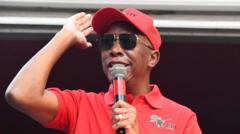As tensions rise within South Africa's coalition government between the ANC and the DA, leaders continue to strive for mutual benefit despite ongoing conflicts. The fear of electoral backlash keeps both parties anchored in an uneasy alliance.
South Africa's Troubled Coalition: Will It Endure?

South Africa's Troubled Coalition: Will It Endure?
The march of South Africa's Government of National Unity faces internal strife, putting its future at risk amid public bickering.
South Africa's political landscape is witnessing a tense but pragmatic alliance between the African National Congress (ANC) and the Democratic Alliance (DA) within the Government of National Unity (GNU). Formed after the ANC's failure to secure a parliamentary majority last year, this coalition has faced ongoing disputes that resemble a troubled marriage where both parties are reluctant to initiate a split.
The GNU partners, President Cyril Ramaphosa and DA leader John Steenhuisen, share a complicated relationship. While their collaboration has yielded success in high-stakes scenarios—like a united front against US President Donald Trump—their internal disputes over legislative decisions and ministerial appointments threaten the alliance's stability.
A recent rift catalyzed by Ramaphosa's dismissal of DA deputy minister Andrew Whitfield has drawn attention to underlying frustrations. Steenhuisen criticized Ramaphosa for unilateral decisions regarding controversial legislation like land expropriation without compensation and a proposed VAT hike, both of which stoked backlash and legal action from the DA. He accused the ANC of undermining collaboration essential for addressing South Africa's dire economic challenges, emphasizing the need for communication and cohesive governance.
Political analysts suggest that, despite their differences, both parties are mired in a dependency that prevents them from severing ties. For the DA, securing a foothold in the government is crucial to counter what they perceive as radical opposition. The coalition has provided a platform for both parties to campaign ahead of upcoming local elections, muddying the waters on whether they would risk alienation by opting for a divorce.
Nonetheless, public spats echo the discord in their partnership, raising questions about the durability of this seemingly forced coalition. As Steenhuisen hinted at the possibility of no-confidence motions against Ramaphosa, tensions lay bare the coalition’s fragility. Yet, both leaders understand the potential electoral repercussions of ending their partnership, leading to uncertainty about their future direction amid an increasingly volatile political climate.
As South Africans await clearer signals about the coalition's fate, experts advise a fundamental change in communication strategies is needed to prevent further splintering. Open dialogues without the theatrics may serve to ease the growing tension and restore some much-needed harmony in South Africa's complicated political arrangement.


















